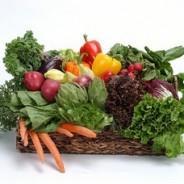
Vegetables have some of the most essential elements to contribute to a balanced diet.
Vegetables are sources of many vitamins, minerals along with other natural substances that may help protect you from chronic diseases. Vegetables are areas of herbaceous plants that are fit for human consumption. These edible aspects of the plant can be stem, leaves, roots, flowers and fruits.
Nutritional value of vegetables defines the presence of these essential substances that are important to support life. Scientists categorize vegetables into nutraceuticals since it is a blend of nutrition and pharmaceutical. Certain chemical substances present in vegetables have rich medicinal value.
Leaf Vegetables
Some common plant leaves we eat as vegetables are spinach, cabbage, turnip greens etc. These vegetables supply rich protein, fibers, minerals like iron and calcium to the body. They also give us phytonutrients like carotenoids, Vitamin C, K and folate. The fat content of these vegetables are extremely low. So if you are on a weight loss regime, leaf vegetables are perfect for your diet.
Legumes
Peas, beans, etc are some of the fruits of legume plants. Legumes have the valuable nutrients – proteins, carbohydrates, vitamins and useful minerals like iron, potassium, calcium etc. There is a very high fiber content. Beans are thought as a suitable substitute to meat for vegans. Essential proteins of beans act like that in meat. Additionally, it has highest fiber content. Peas possess a high content of Vitamin A and Vitamin B1. Vitamin B1 is usually referred to as anti-neuritic as it helps to prevent ailments associated with nervous system.
Inflorescent Vegetables
Inflorescent vegetables are cauliflower, broccoli etc. Because the name suggests, they fit in with the flower-bearing part of the plant. These types of vegetables are full of Vitamin C, dietary fiber, calcium etc. These vegetables supply us an element called sulforaphane; it is an anti-cancer and anti-diabetic compound. Body fat content of inflorescent vegetables is low.
Your Diet
It’s not necessary to go completely raw together with your foods to get some of the benefits that raw-food enthusiasts reap. Unless it’s making you have digestive or other ailments, your diet might not be problematic. Going totally raw is not a problem either; it’s a personal choice many make. However, in the event you consider adopting a raw diet, you might want to consult your doctor first. Making this type of sudden and drastic change will make you feel sick because going raw is known to have a detoxifying effect.

Nutritional Value of Vegetables
What Vegetables Do
Many raw food specialists say eating raw vegetables gives your body beautiful skin, a greater immune system, more stamina and an increased feeling of mental clarity. There could be more. Fresh vegetables contain up to 90 percent water and 60 % oxygen, eating them raw (cooking burns out these molecules) may help prevent cancer. It’s been proven that cancer can’t appear in highly oxygenated environments. Vegetables also carry a good amount of vitamins and minerals, many of which have been linked to lowering risks of developing cancer in addition to heart disease and diabetes.
Health Benefits
- Diets rich in foods containing fiber, for example some vegetables and fruits, may reduce the risk of heart disease, obesity, and kind 2 diabetes.
- Eating vegetables and fruits rich in potassium included in an overall healthy diet may lower blood pressure, and can also reduce the risk of developing kidney stones and help to reduce bone loss.
- Eating a diet rich in vegetables and fruits included in an overall healthy diet may reduce risk for heart disease, including heart attack and stroke.
- Eating foods for example vegetables that are lower in calories per cup rather than some other higher-calorie food may be useful in helping to reduce calorie intake.
- Eating a diet rich in some vegetables and fruits included in an overall healthy diet may protect against certain types of cancers.
